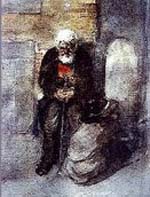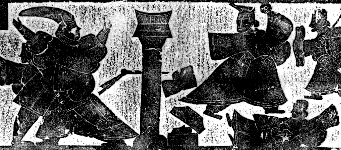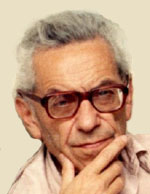Approaching History
QuestionsSome people make a whole philosophy out of the business of asking questions. They insist that you have to ask questions of history. You have to have a hypothesis, you have to have a model, you have to come to the past with a question in mind.
Not really, and perhaps also, not ideally.
The danger in starting with our own question is that we will emerge from our study with our original impression, our bias if you will, still intact. If so, we have learned nothing. The methodological principle must be that any question we start with is subject to modification by what we actually find. If you set off with your basket looking for mushrooms and come back with diamonds, your grandmother will probably manage to reconcile herself to the diamonds. The trick is to sacrifice your expectation when something better turns up. History, or nature, may know more about itself than you know, or can imagine the first time you try. The incidental or even accidental discovery, the thing found while looking for something else, is a much-told tale in the sciences. For example:
While engaged in studying the function of the pancreas in digestion in 1889 at Strasbourg, Professors von Mering and Minkowski removed that organ from a dog by operation. Later, a laboratory assistant noticed that swarms of flies were attracted to the urine of the operated dog. He brought this to the attention of Minkowski, who analyzed the urine and found sugar in it. It was this finding that led to our understanding of diabetes and its subsequent control by insulin. (Beveridge 30)
You have to know enough to recognize good luck when it happens, whence Pasteur's dictum:
Chance favors the prepared mind.
And you have to be adept at abandoning a first idea. It's harder than you think. Faraday:
The world little knows how many of the thoughts and theories which have passed through the mind of a scientific investigator have been crushed in silence and secrecy by his own severe criticism and adverse examinations, that in the most successful instances not a tenth of the suggestions, the hopes, the wishes, the preliminary conclusions have been realized.
This is not some hack talking, some shilling theorist; it is one of the all-time great discoverers. Here's another report from the same level. Darwin:
I have steadily endeavored to keep my mind free so as to give up any hypothesis, however much beloved (and I cannot resist forming one on every subject) as soon as facts are shown to be opposed to it . . . I cannot remember a single first formed hypothesis which had not after a time to be given up or greatly modified.
It may not be too much to say that the success of an investigation will often depend on the failure of the expectation with which it started.
Minima
You can't do nothing at all. As the Polish joke reminds us:
Goldberg, a pious but poor Jew, prayed to God; he asked to win the lottery. He didn't win. Next week he prayed again: He had faithfully kept the Law; his poverty was a reproach to the idea of divine justice; he begged to win the lottery. Again, he didn't win. A third time he prayed, warning God that his example could cause others to question their faith. He pleaded to win the lottery. Then came a voice from Heaven: "Goldberg! Goldberg! Give me a break! Buy a ticket!"
There is an entry fee; a minimum effort. You have to buy a ticket. But then you have to give the the lucky break room to happen. Don't crowd it out with your agenda. Give it air.
Otherwise, you will shut out things you want to know. It is extremely hard to see something when your faculties are alert in a different direction. Darwin tells how he and a colleague completely failed to observe certain unexpected phenomena when they were exploring a valley together:
Neither of us saw a trace of the wonderful glacial phenomena all around us; we did not notice the plainly scored rocks, the perched boulders, the lateral and terminal moraines.
Viewed from this angle, an initial expectation or question is just a way of getting started, a way to raise the dust. Once you are started, you study the dust (or the dog urine), and you modify or abandon your question accordingly. More drastically, in the spirit of Francis Bacon or Fustel de Coulanges, you can start out with an empty basket. Nobody is really checking passports at the gate of the past. Just walk in and hang out. Watch the passersby, wait to see what is going on, lurk until you get a sense of what the people of the time, or at least the ones on that particular street corner, are up to.
An Example
Some purposive student who is working a corner back in the 04th century, looking intently for data on the assigned topic "forgiveness in early China" will presently get fed up with not finding any such data, and will go back to ask the teacher for another topic. You are still there, just soaking up observations. Who knows what might follow? It depends how good you are, and what kind of corner you have camped out on.
But with the general category of forgiveness and its converse somewhere in the back of your mind, and your eyes and ears otherwise open, you might come to notice how greatly these people resent a slight; how highly developed is the lexicon of insult; how ramified are the gestures of defiance; how prevalent are slander, rumor, and accusations of witchcraft; how a class of sword-bearing desperadoes exist for the sole purpose of taking vengeance, even at the cost of their lives, on behalf of those not strong enough to do it for themselves: widows, orphans, the aggrieved, the ghosts of those wrongly executed. You notice how assassins, like Jing Kv, acting (in the picture above) for the aggrieved Prince Dan of Yen, are among the heroes of the tradition. You gradually realize that there is a whole culture of revenge out there. It may then occur to you, as it did not occur to the person who was looking for it too directly, that there is a reason why there are no elaborate rituals of forgiveness in this culture. Their place is taken by other things. Early Chinese culture chose one way of dealing with injuries and resentments. And in so doing, it neglected an alternate possibility - such as the ethos of reconciliation which is so highly developed, so hypertrophied, in some Mediterranean cultures, but is absent or rudimentary in early China.
Then there is the lex talionis concept in early Near Eastern law, and the ways it is modified or mitigated in later Near Eastern law. There exists a Chinese story about the mitigation of an earlier harsh law code. That is interesting. On examination, the story turns out to be a myth. That is interesting too. The myth is located at an impossibly early date. That is even more interesting; it seems that the myth does not record a cultural event, but at most marks the backward displacement of a cultural event. We can then ask, in whose interest would it have been, in the 04th century, to project such an event back into the 06th century? Was it felt at that time that there was a need to inject at least a modicum of mildness into the culture? If so, felt by whom? For that matter, why do the Chinese avengers, the people on the other side of the violence spectrum, implausibly claim descent from Chidyau Kai, a known disciple of Confucius (05c)? Now we are putting into words the questions that are latent in the things we have observed. Those may well be useful questions.
Somewhere along the line, as we learn from our frustrated attempts to find what is not there, and begin to notice what is there instead, and as what is there suggests unanticipated but interesting questions, the "forgiveness" assignment has after all become a term paper. But not in the hands of the student who treated that topic as a too highly focused and a too directly pursued agenda.
You can just watch people, as described above, and it is especially useful to that particular example if you can watch them insulting each other. It is even better if you can get them fighting with each other. If two texts are arguing back and forth, in effect they are asking questions of each other, and their questions are probably going to be more relevant to the concerns of their time than anything you bring with you from the present. Just sit back and take it in. Mencius or his followers slugging it out with Sywndz on the question of human nature. James of Alphaeus and Paul of Tarsus jabbing at each other over the question of faith versus works, and what to make of the example of Abraham. After a few minutes, you may say, Hmm, the rules of engagement here are not quite what I would have expected, but the issue between them seems to be . . .
We let the natives frame the terms of their own debate, and define their own questions. History is not exactly a laboratory science, but it can sometimes rise to the status of a spectator sport.
History
There is a vertical counterpart of this horizontal technique. It is this: You can also set people to fighting across a time barrier.
Students in a Harvard Chinese literature seminar were once given a single assignment for the semester: to compare Ywaen (Mongol Dynasty) and Ming texts of the same opera, word by word, and to attempt to explain every difference. What came out was a whole range of results: sound change, vocabulary change (the disuse of Mongol loanwords in the court language of the native dynasty which followed the Mongols), a shift in the kind of musical artistry shown by those who wrote the arias, many differences in stage conventions, some of them implying a larger budget for the production of the plays, and finally, such items as the relative freedom of movement enjoyed by women under the Mongols, and the notable restriction of that movement, at least as portrayed on the stage, under later orthodox Chinese control. What emerged from the semester was a vision of the movement of history, lexical and social, seen all together in one complex piece, a century long, and as wide as humanity itself is wide.
The Art of Asking
Asking questions is not forbidden, but it takes more skill than people think, and that skill is not universal. Some people, besides a wide acquaintance with a given area of attention, have a genius for finding fruitful questions, for sensing when a hard problem is ready to "go," for locating cracks into which to insert a prybar, for knowing which leads might lead somewhere. Paul Erdos was one of them. Said Richard Guy:
"He was the problem poser par excellence. His ability to formulate problems of any level of difficulty is legendary. Many people can ask questions which are impossibly difficult or trivially easy. It is given to few of us to tread the narrow path between triviality and unattainability. Erdos problems were not Hilbert problems, which took half a century or more to settle. Erdos questions were always just right. . . But Erdos not only asked the right questions. He asked them of the right person. He knew better than you yourself what you were capable of."
And here is Ron Graham on Erdos:
"He had the unique ability [said Ron Graham] to identify problems which were just beyond what you could currently do. It's easy to state impossible problems, but he would state a problem whereby if you could solve this problem you would then know more than you knew before, and open the door wider. It was like climbing a mountain and being able to drive one more piton in, to be able to work your way up the mountain."
More generally:
Anyone with alertness of mind will encounter during the course of an investigation numerous interesting side issues that might be pursued. . . The majority are not worth following, a few will reward investigation, and the occasional one provides the opportunity of a lifetime. How to distinguish the promising clues is the very essence of the art of research. (Beveridge p35)
People who are skilled at other things may not have this particular gift. One who does have it, and who has a certain intellectual generosity on top of that, makes a good manager or inspirer of other people's research. A team, or a department, should contrive to have at least one such person in its midst. Among the good askers of questions, a good discriminator among questions.
Readings
- Francis Bacon. Essays
- David Hackett Fischer. Historians' Fallacies. Harper 1970. A "Baconian Fallacy" is expounded on p4-8. But it is not really an objection to Fustel de Coulanges' methodology to note that in his practice, like all Frenchmen of his time, he gave scant shrift to Germany; or that, like many academics, he resented criticism. Those are personal shortcomings, not methodological refutations
- James J Y Liu. The Chinese Knight Errant. Chicago 1967. Confucius's disciple Chidyau Kai is not in the index, which merely means that there is always a little more to do. Thank goodness
- Alvin P Cohen. Tales of Vengeful Souls: A Sixth Century Collection of Chinese Avenging Ghost Stories. Institut Ricci 1982. Among the low-culture things that might have suggested a line of approach to a student of the high culture
- Paul Hoffmann. The Man Who Loved Only Numbers. Hyperion 1998. Rambling, but still the best accessible life of Paul Erdos
17 Mar 2006 / Contact The Project / Exit to Outline Index Page




